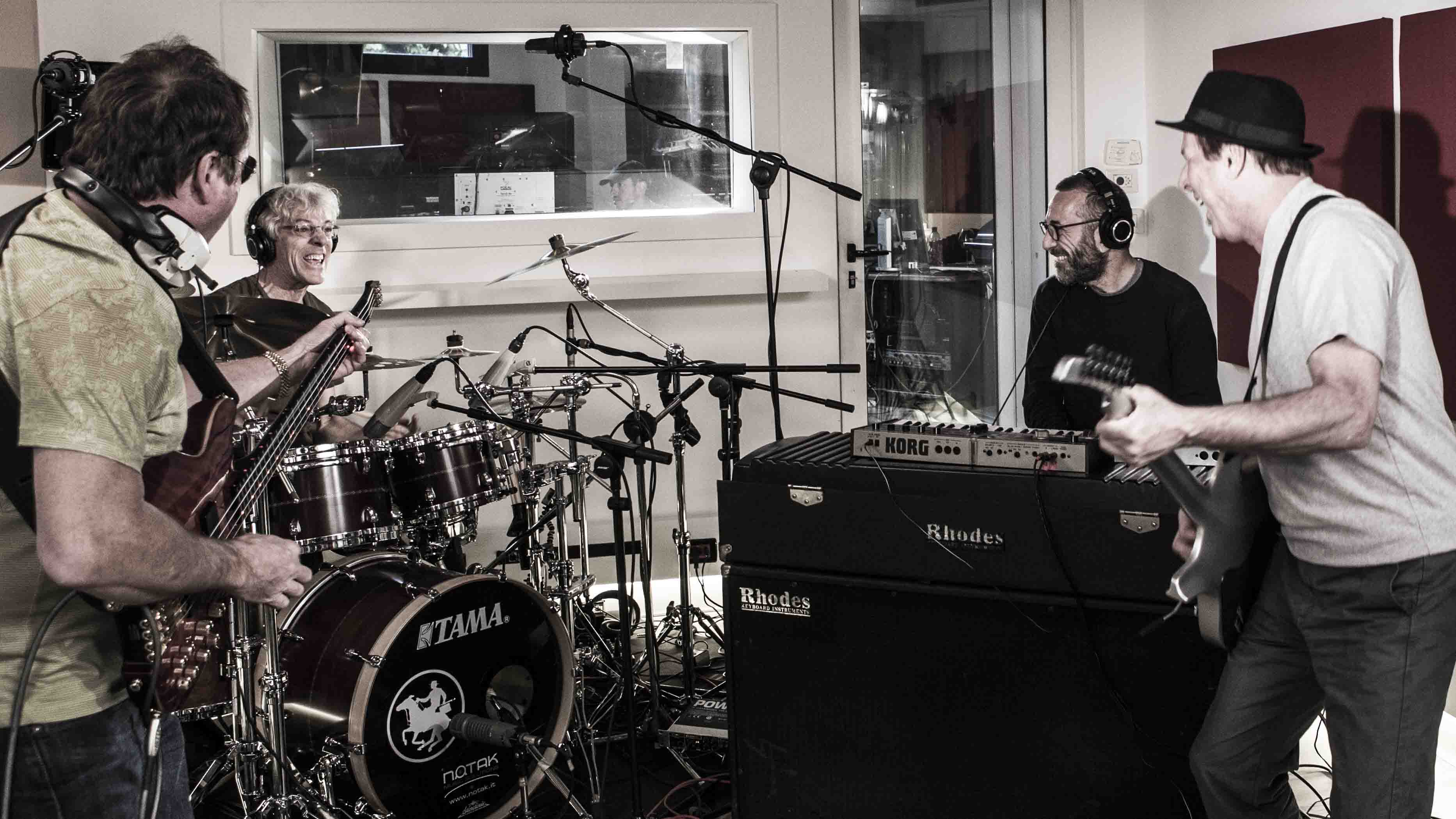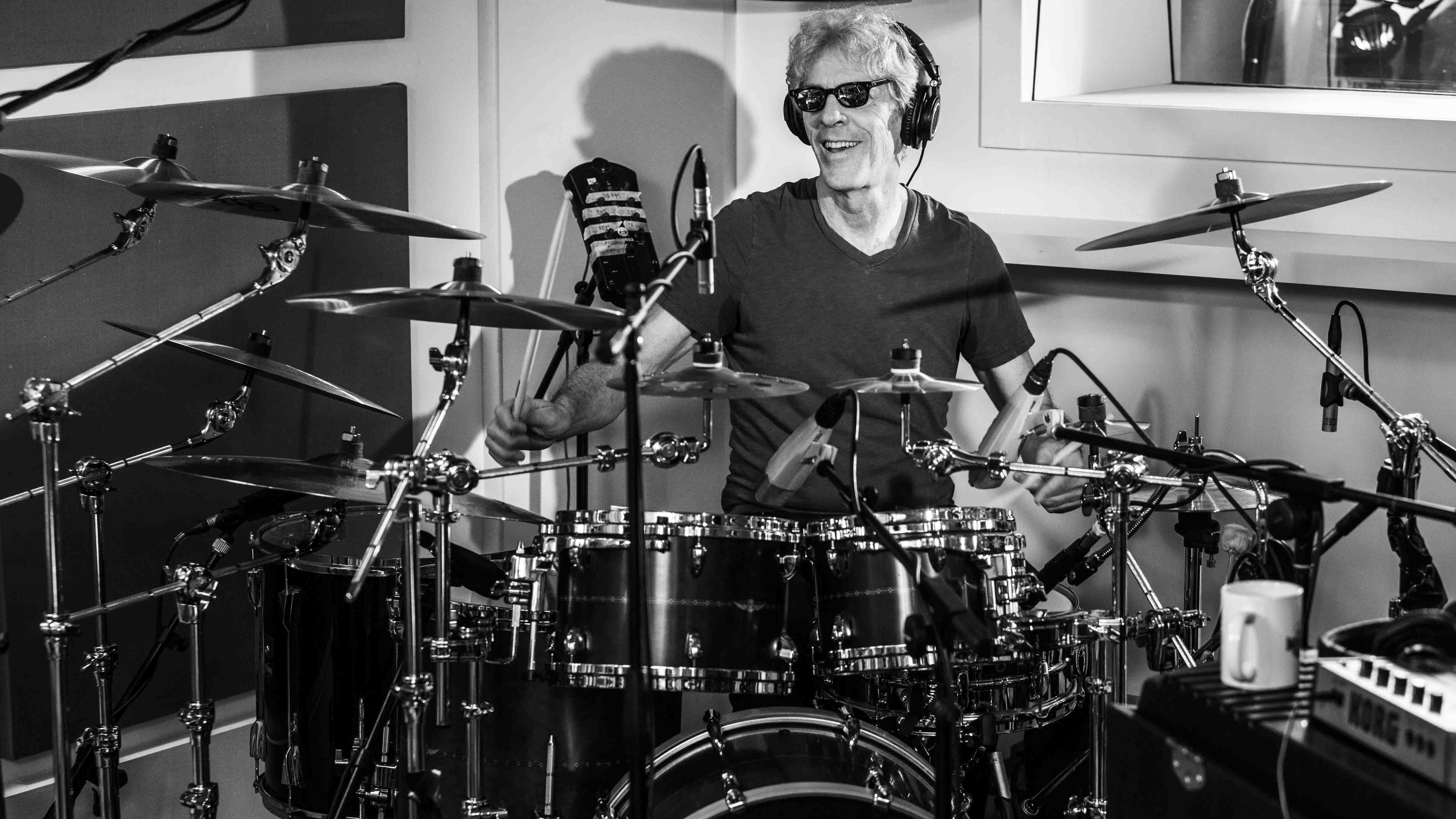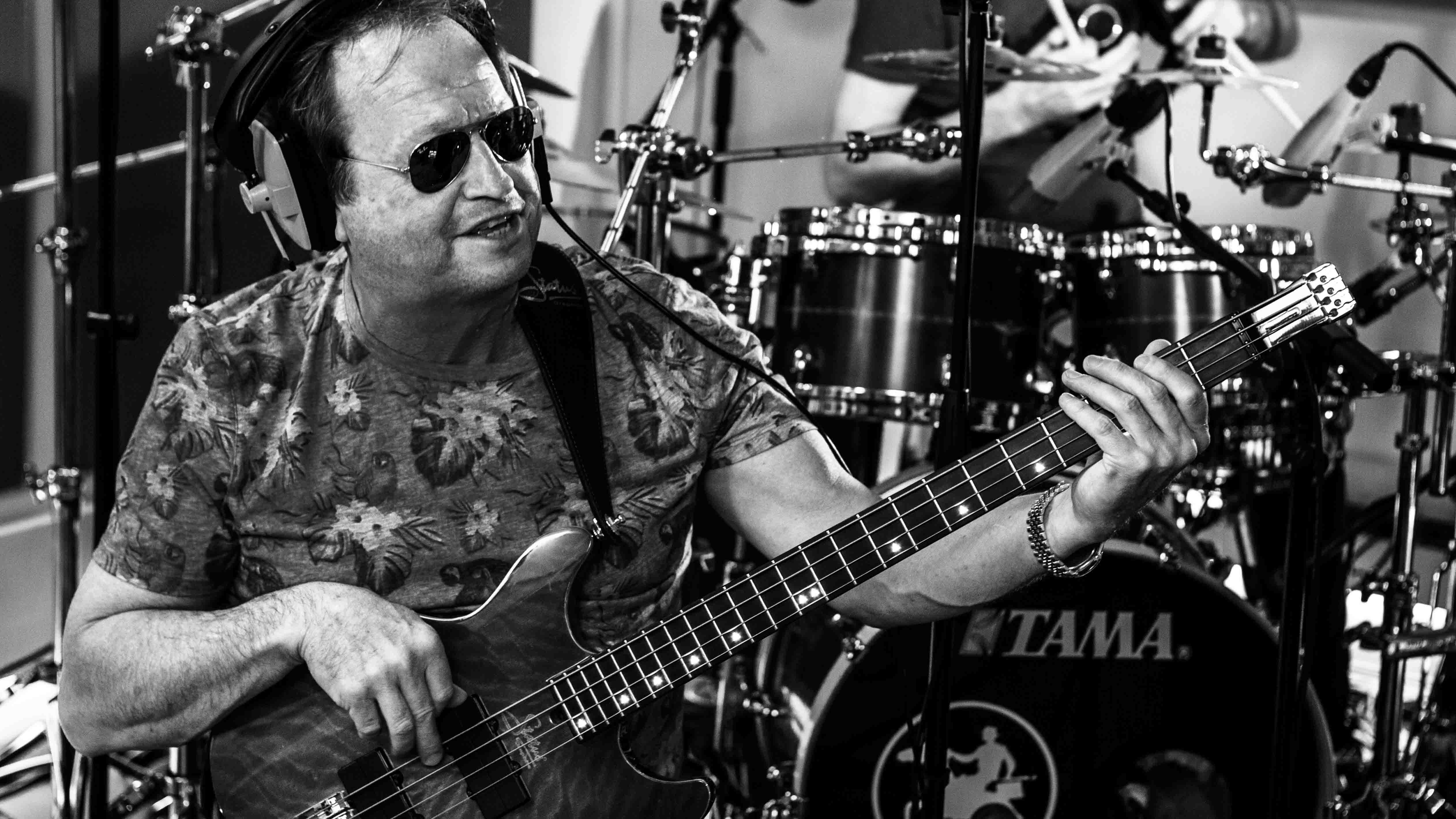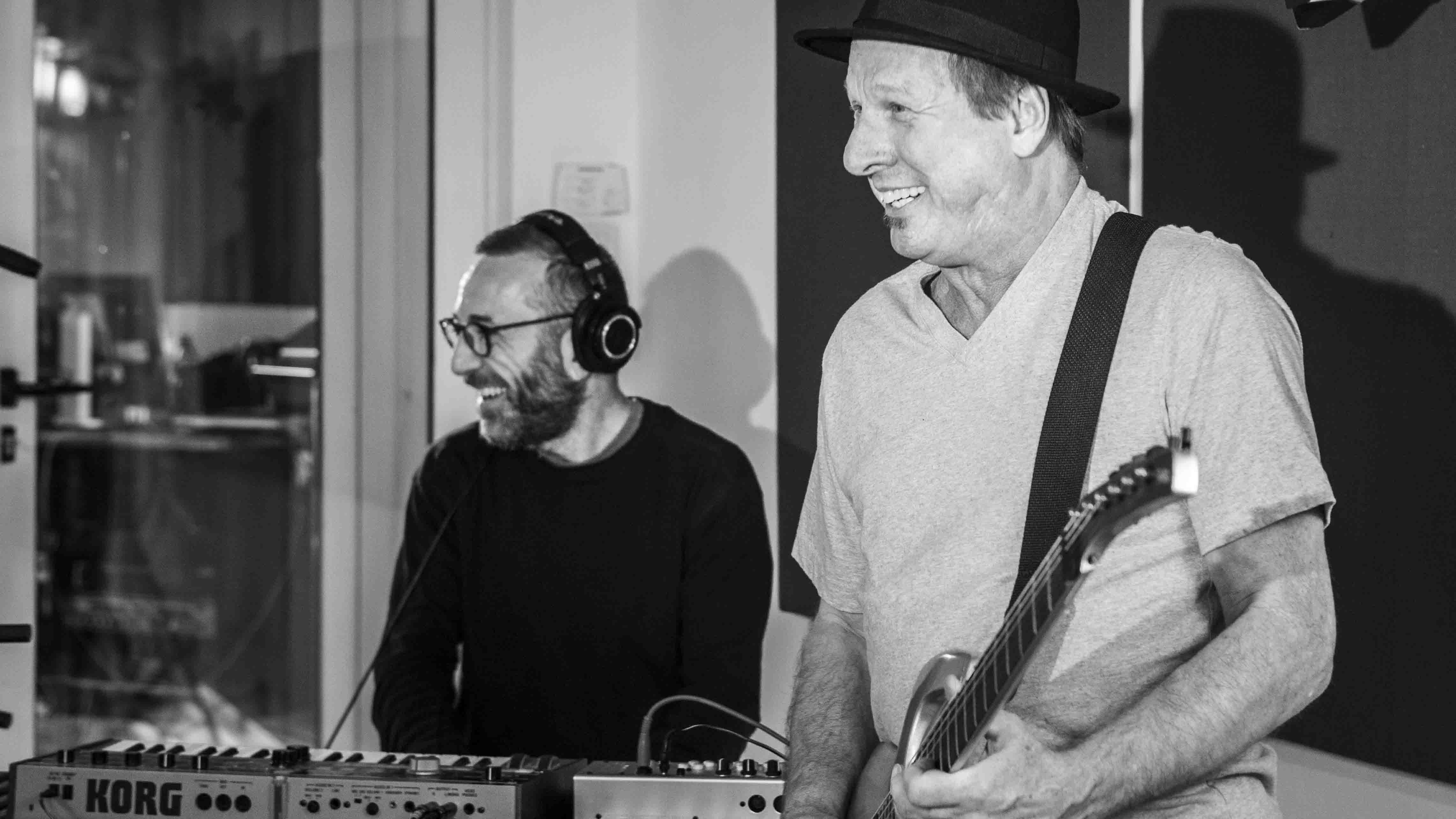Stewart Copeland, Adrian Belew and Mark King on the chemistry that fuelled unlikely new supergroup, Gizmodrome
“There are too many drum fills and the guitars are insane!”

There are supergroups, and then there’s Gizmodrome: a band with a level of collective musicianship that can be best described as unfathomable.
Formed by drummer/singer Stewart Copeland (The Police), with Adrian Belew (King Crimson, David Bowie, Frank Zappa) on guitar, Mark King (Level 42) drafted in on bass and Vittorio Cosma (PFM) - they’re also a bunch of musicians you’d never have expected to see together.
With their self-titled debut album landing on shelves later this month, MusicRadar were invited to a top-secret hotel location to find out the story behind one of the more unexpected collaborations in recent history…
How much were you aware of each other before you started working on Gizmodrome?
When I thought of Adrian Belew and me together, it was a bit of a no-brainer… I expected there would be some chemistry going
Stewart Copeland
Stewart Copeland: “When I thought of Adrian Belew and me together, it was a bit of a no-brainer… I expected there would be some chemistry going. Throw Mark into the pot and it’s hard to stay rational when he starts pulling out that shit! We knew of each other - Adrian and I played together briefly, as had Mark and I…”
Adrian Belew: “It was very brief, just one show as a trio put together by Stanley Clarke in San Francisco. It was an event about music and film; we each played one of our songs from a film and that was it. I didn’t see Stewart again for 30 years! I never knew Mark and barely knew Vittorio… Him and our producer Claudio Dentes started sending me emails every summer asking if I’d like to come and play, hang out in the Italian sun, live la dolce vita and have pasta with Stewart Copeland.”
SC: “That’s the only part that panned out. There was no swimming pool or villa, just too much pasta and Stewart Copeland! Italy is an extreme comfort zone. Half the reason for this project was Italy! We started off comfortable and took it down from there, haha!”
So when did you realise this was turning into a band?
AB: “When I arrived, Stewart had a plan that I didn’t know about. They kinda tricked me - which is a good thing, because I might not have been as enthusiastic coming over if I thought I was joining another band… I didn’t think I’d ever join another band, and there’s nothing wrong in saying that!
“When I came over, it was to play four tracks on some project Stewart was involved in. Once we got started, we set up in this beautiful recording room where everyone could see and hear each other, playing together.
“We started doing basic tracks of songs, which is a bit unusual for me - I’m more used to coming in at the end and doing wild stuff over the top. Within a couple of days I realised, ‘Hey, you know what? This is a band!’ and that was Stewart’s design from the beginning… not telling me, haha!”
It’s as if I’ve played with Stewart my whole life, and I say that most sincerely
Mark King
Mark King: “I learned it’s always good to say yes when somebody gives you a shout. Never say, ‘Ooh, I can’t be bothered’; say, ‘Yes please!’ Stewart had prepped us saying there were a good number of songs that were indicative of where we’d be going, but with any collection of musicians you never know how it’s actually going to pan out until you get there and do it.
“It’s as if I’ve played with Stewart my whole life, and I say that most sincerely. Later, I found out that Adrian is a drummer, too… it just made so much sense, because everyone was clicking in. We’re all on the same wavelength; we didn’t have really ask much of each other because everyone was in charge of figuring their own shit out.”

Arrange and destroy
What were those first jams like?
AB: “I was impressed from day one. I didn’t know Mark - so sitting opposite him and hearing that, I thought, ‘Boy, that guy is great!’ I barely knew Vittorio, but I knew immediately he could do anything he wanted.
“They did have all these songs ready to go - these had been written every summer over the course of 10 years. They would put them away in their cookie jar and when we arrived, it all got pulled out. So we had material; it wasn’t like we showed up scratching our heads, wondering what to do! There were songs already written by those guys, ready to go…”
SC: “And fucked up by these guys… arrange and destroy! That was the plan: we threw away the concept of sanctity for the composer. Just because I wrote a song doesn’t mean that’s godhead. I knew Mr Belew would come along and blow my mind, inventing shit I never would have thought of in a million years. Digging for that, he would start his own creative process.
You get a better result when you give it up - yes, I wrote the song, but now I want to see what happens
Stewart Copeland
“Say, when you go into play for Trent Reznor and he says, ‘Here’s your track and here’s what I want you to play,’ Adrian can totally deliver that. But when you open up the place and really get the mind working, you get the real Adrian Belew, the real crazy shit that no-one else could have invented. So you get a better result when you give it up - yes, I wrote the song, but now I want to see what happens.
“Also, Mark King is a man of many surprises. You know that million-dollar thumb? Well, I think the insurance has gone up; it’s gone up to six-million! Everyone is going to shit their pants when they hear Mr King now because he’s not using that thumb. He even pulled out a plectrum - which gave me an erection I still have, not that you’d notice, haha!”
MK: “There was a girth and plethora of ideas from everyone. As soon as Adrian plugged in, all these sounds started coming out. The funny thing about Adrian is nobody look more surprised about how great the guitars were sounding than him! It was a joy to see.
“We’d get to the end, listen back and started expanding on things. I would be wondering if the bass sound was right, so would switch to a Jazz bass and suddenly it felt like I had the sound.”
Is that the secret to the chemistry: improvisation through a meeting of the minds?
We didn’t think anyone sane would ever hear it. Originally, the mission was to be under the Italian sky on summer evenings. Pasta was the mission!
Stewart Copeland
SC: “Crossing ideas with other people works much better. That’s how we got results we never would have expected. Imagine trying to make a rock album, hiring some guys and telling them what to play. Hmm…”
AB: “And Stewart could easily have done that. He could have had the exact notes in mind played by anybody. But what I loved is that he would say, ‘Here guys, take this and make it your own to a certain degree!’ After a few days, I thought this really could be a band… we need to keep on going. It all changed within a couple of days; it felt like we had to do this because it was turning out too good!”
SC: “It sounds better that way. You can hear the snap, crackle and pop of four guys really going for it. We didn’t think anyone sane would ever hear it. Originally, the mission was to be under the Italian sky on summer evenings. Pasta was the mission! There was a nihilistic attitude to it all; we had no cares. We just wanted to blaze through it, and through that we got some incredible spark to the backing tracks. A good song will survive any abuse.”
AB: “We never stopped; we just kept going. The whole process was very immediate. After figuring out what the song was supposed to be in the control room, we’d go into the full-on recording room with our gear and work it up. And quickly! We’d do maybe one, two, maybe three takes and that was that. By then, we’d say, ‘That’s enough!’ and usually go for the second take.
“They were so fun to play over - that’s what threw me into this more than anything else. I felt comfortable with this music and just knew my place in it. I didn’t care about who sang or whatever, I just wanted to play guitar with these guys. I love that kinda role - it reminded me of my role in Talking Heads on Remaining Light. The music just fit; we knew what to do.”

Dark humour
It’s certainly an eclectic record, to say the least. How would you describe the music?
SC: “We made this record. We love it. Our wives tell us they love it, but that’s all we’ve got! So arriving into the main European cities to promote it, we learned more about what we’d made from the questions people were asking!
“Someone came up with punk-prog. It’s prog because there are too many drum fills and the guitars are insane, but in fact, our intention is to burn down the city and eat your children. That energy of just fucking going for it.”
I never thought about how these songs would go down on the radio - I haven’t thought about being on the radio in 20 years. I’m still not on the radio!
Adrian Belew
AB: “It’s hard to call it pop in the sense that we all know the ingredients to pop songs and you have to be on a mission to create it. There are certain components for pop that we never thought of. I never thought about how these songs would go down on the radio - I haven’t thought about being on the radio in 20 years. I’m still not on the radio! Let’s see what happens…”
SC: “We shall dominate the airwaves while we eat your children! Or pasta. Either is fine. Maybe children with pasta!”
You could say there’s definitely a sense of humour to it all…
SC: “Sense of humour? Godammit, I want to burn down the city and eat your children. Are you not just a little bit frightened, not even remotely intimidated by these anarchic, destructive and hostile lyrics? Well, what can you do but laugh when the sharks are under the raft… that’s a line from one of the songs called Zombies In The Mall.”
AB: “When it comes to vocals and lyrics, Stewart’s a storyteller. His vocals are built on character and they’re totally over the top. It’s 100% him and his thoughts on everything. If I tried to adopt that identity, I would have utterly failed.
“Though when we got to the choruses, we realised Mark and I have voices that blend perfectly and naturally, so we’d do those. That became the blueprint we followed as often as possible. It’s a big part of the charm: the playfulness. Stewart thinks he’s Darth Vader over there, saying how dark it all is. No, it’s not!”
SC: “Even Darth Vader has to chuckle sometimes. I’m his funny side.”
AB: “It’s a cheerful evil.”
SC: “And the right side of hell. Here’s something I didn’t know about Mr Belew, and it’s my favourite thing about him. He was stolen off Frank Zappa by David Bowie. Then went on with 33 years of King Crimson and played on Taking Head’s Remain In Light, one of the most important albums ever. Then I discovered he’s Mr Graceland (Paul Simon, 1986) as well.
“Fuck me, that’s two of the most important albums of that era - and that’s now in our band.”

Get out there
You’re some of the most seasoned players in music. What are the main obstacles you see modern musicians facing, and how do you think they can overcome them?
MK: “You need to get in a room with other musicians. The biggest danger today, especially with fantastic technology like GarageBand or looping pedals available, is that you don’t work with others.
“Gizmodrome worked so well because we did it together. Other musicians will make you play different phrases. Stewart might play a certain way; it’s way more than a backbeat because it shapes how you play. The noises that come out of Adrian’s amps will inspire me to come up with something that wasn’t there… that triggers this.”
If you sit in a room by yourself, you can only go so far… To really excite yourself, you need to live the life and get out in front of people
Adrian Belew
AB: “Two things helped me when I was young. I was madly passionate and I also found a band to play in early on. Practising would be the first thing I would do when I woke up and then got back from school.
“I started as a drummer, but soon switched over to teaching myself guitar, and there was no way you could stop me. I lived and breathed it. If you have that passion, you’re going to propel. After finding a band, before I knew it, that was our life. We lived in a fantasy world that we were The Beatles.
“If you sit in a room by yourself, you can only go so far. It might be fine, it might be exactly what’s needed, but to really excite yourself, you need to live the life and get out in front of people. These days, it’s more important than ever, it’s where you make the money now the music business has managed to screw itself so badly.
“It all comes from experience. You can’t expect to have all that intimate knowledge and intuition from the get-go or when you’re 16 or 20. It takes a while. You have to keep on working with different people. I’m still learning from these guys…”
SC: “Getting out there is also how other people start to appreciate it - which will make you want to continue. You gotta jump off the cliff. Nobody’s going to die; it’s just music… so jump!”
Gizmodrome's self-titled debut album is out on 15 September via earMUSIC.
Amit has been writing for titles like Total Guitar, MusicRadar and Guitar World for over a decade and counts Richie Kotzen, Guthrie Govan and Jeff Beck among his primary influences. He's interviewed everyone from Ozzy Osbourne and Lemmy to Slash and Jimmy Page, and once even traded solos with a member of Slayer on a track released internationally. As a session guitarist, he's played alongside members of Judas Priest and Uriah Heep in London ensemble Metalworks, as well as handling lead guitars for legends like Glen Matlock (Sex Pistols, The Faces) and Stu Hamm (Steve Vai, Joe Satriani, G3).
